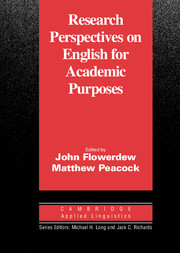Book contents
- Frontmatter
- Contents
- List of contributors
- Series editors' preface
- Preface
- I ISSUES IN ENGLISH FOR ACADEMIC PURPOSES
- Introduction to Part I
- 1 Issues in EAP: A preliminary perspective
- 2 Language use, language planning and EAP
- 3 EAP-related linguistic research: An intellectual history
- 4 Linguistic research and EAP pedagogy
- 5 International scientific English: The language of research scientists around the world
- 6 Discipline specificity and EAP
- 7 World Englishes: Issues in and from academic writing assessment
- 8 Addressing issues of power and difference in ESL academic writing
- 9 ‘I'll go with the group’: Rethinking ‘discourse community’ in EAP
- 10 EAP assessment: Issues, models, and outcomes
- II THE ENGLISH FOR ACADEMIC PURPOSES CURRICULUM
- References
- Index
8 - Addressing issues of power and difference in ESL academic writing
Published online by Cambridge University Press: 05 October 2012
- Frontmatter
- Contents
- List of contributors
- Series editors' preface
- Preface
- I ISSUES IN ENGLISH FOR ACADEMIC PURPOSES
- Introduction to Part I
- 1 Issues in EAP: A preliminary perspective
- 2 Language use, language planning and EAP
- 3 EAP-related linguistic research: An intellectual history
- 4 Linguistic research and EAP pedagogy
- 5 International scientific English: The language of research scientists around the world
- 6 Discipline specificity and EAP
- 7 World Englishes: Issues in and from academic writing assessment
- 8 Addressing issues of power and difference in ESL academic writing
- 9 ‘I'll go with the group’: Rethinking ‘discourse community’ in EAP
- 10 EAP assessment: Issues, models, and outcomes
- II THE ENGLISH FOR ACADEMIC PURPOSES CURRICULUM
- References
- Index
Summary
To become literate in a globally powerful language that is also prestigious in academic communication, language-minority students have to negotiate a place for their local discourse conventions, intellectual traditions, cultural practices and the vernacular. Second language composition teachers are not unaware of the conflicts of power inequalities and cultural difference involved in language acquisition. However, they do not have at their disposal the methods and approaches which would enable them to teach writing with a sensitivity to such concerns. Although recent philosophical and intellectual movements (such as critical theory and post-structuralism) have seeped into all academic or educational domains today, such awareness has not always translated itself pedagogically. There is therefore a gap in the present state of second language (L2) composition scholarship.
If the available approaches to L2 writing ignore issues of power and difference or, even, lead to the political and cultural domination of language-minority students, it may become imperative to construct new approaches consonant with our emerging recognitions. In order to venture into this challenging and exploratory enterprise, this paper will first analyse the philosophical and ideological foundations of the existing approaches from the perspective of L2 students. I will go on to narrate a case study of a student's research writing to illustrate the ways in which issues of power and difference may be negotiated in L2 writing.
- Type
- Chapter
- Information
- Research Perspectives on English for Academic Purposes , pp. 117 - 131Publisher: Cambridge University PressPrint publication year: 2001
- 15
- Cited by

